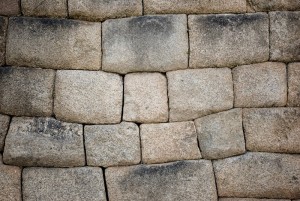From the Letter to the Romans:
Greet Prisca and Aquila, who work with me in Christ Jesus, and who risked their necks for my life, to whom not only I give thanks, but also all the churches of the Gentiles. Greet also the church in their house. Greet my beloved Epaenetus, who was the first convert in Asia for Christ. Greet Mary, who has worked very hard among you. Greet Andronicus and Junia, my relatives who were in prison with me; they are prominent among the apostles, and they were in Christ before I was. Greet Ampliatus, my beloved in the Lord. Greet Urbanus, our co-worker in Christ, and my beloved Stachys. Greet Apelles, who is approved in Christ. Greet those who belong to the family of Aristobulus. Greet my relative Herodion. Greet those in the Lord who belong to the family of Narcissus. Greet those workers in the Lord, Tryphaena and Tryphosa. Greet the beloved Persis, who has worked hard in the Lord. Greet Rufus, chosen in the Lord; and greet his mother — a mother to me also. Greet Asyncritus, Phlegon, Hermes, Patrobas, Hermas, and the brothers and sisters who are with them. Greet Philologus, Julia, Nereus and his sister, and Olympas, and all the saints who are with them. Greet one another with a holy kiss. All the churches of Christ greet you.
(From the Daily Office Lectionary – Romans 16:3-16 (NRSV) – July 28, 2014)
 Paul often ends his correspondence with these requests that the readers convey his personal greetings to specifically named people. I often find myself skimming those parts of the reading, just passing quickly over them. But, also, I often find myself pausing at these names, wondering about them. Who were they? What did they do in their daily lives? How is it that Paul was personally acquainted with them?
Paul often ends his correspondence with these requests that the readers convey his personal greetings to specifically named people. I often find myself skimming those parts of the reading, just passing quickly over them. But, also, I often find myself pausing at these names, wondering about them. Who were they? What did they do in their daily lives? How is it that Paul was personally acquainted with them?
Once upon a time I thought about preaching a series of sermons — or maybe writing some short stories — based on fanciful biographies for these named but now forgotten members of the early church. I gave up on that when I realized I had neither the gift for fiction nor sufficient knowledge of daily life in the First Century to do so credibly. Maybe someone else will do that — I would be among his or her readers if someone did.
When I read these names, I cannot help but think of a passage in the Book of Sirach, a passage read at my late brother’s funeral several years ago:
Let us now sing the praises of famous men, our ancestors in their generations. The Lord apportioned to them great glory, his majesty from the beginning. There were those who ruled in their kingdoms, and made a name for themselves by their valor; those who gave counsel because they were intelligent; those who spoke in prophetic oracles; those who led the people by their counsels and by their knowledge of the people’s lore; they were wise in their words of instruction; those who composed musical tunes, or put verses in writing; rich men endowed with resources, living peacefully in their homes — all these were honored in their generations, and were the pride of their times. Some of them have left behind a name, so that others declare their praise. But of others there is no memory; they have perished as though they had never existed; they have become as though they had never been born, they and their children after them. But these also were godly men, whose righteous deeds have not been forgotten; their wealth will remain with their descendants, and their inheritance with their children’s children. (Sirach 44:1-11)
These friends of Paul are those of whom “there is no memory,” those who “have perished as though they had never existed; they have become as though they had never been born.” Nothing of their lives remains other than these greetings in Paul’s letters. And there are countless others of those early followers of Jesus of whom even less is left . . . .
Except, of course, the church. These forgotten followers of the way are the lowest course of the living stones which are built up into the spiritual house that is the church (1 Pt 2:5), that “house not made with hands, eternal in the heavens.” (2 Cor 5:1) They are the foundation stones lying next to and alongside the Cornerstone.
The church is “their wealth [which] remains with [us] their descendants.” So don’t pass over the names of those to whom Paul sends personal greetings. Pause and give thanks for them. Without them, we wouldn’t be here.
====================
A request to my readers: I’m trying to build the readership of this blog and I’d very much appreciate your help in doing so. If you find something here that is of value, please share it with others. If you are on Facebook, “like” the posts on your page so others can see them. If you are following me on Twitter, please “retweet” the notices of these meditations. If you have a blog of your own, please include mine in your links (a favor I will gladly reciprocate). Many thanks!
====================
Father Funston is the rector of St. Paul’s Episcopal Church, Medina, Ohio.



Leave a Reply